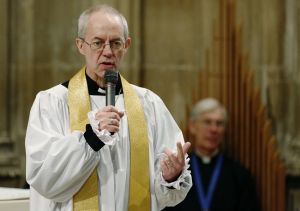New Anglican head urges trust in God, not 'hero leaders'

The new leader of the Church of England warned against "hero leader culture" and the limits of human efforts in his Easter sermon, urging congregants to look beyond flawed humanity and to trust in God's rule and control.
The Archbishop of Canterbury the Rev. Justin Welby, who was enthroned 10 days earlier, delivered his message at Canterbury Cathedral.
The diocese of Canterbury in southeastern England is the oldest see in the church.
In his message, Welby explained that fear and a false view of people leads to hero leaders, who always fail.
"Put not your trust in new leaders, better systems, new organizations or regulatory reorganization," he said.
"They may well be good and necessary, but will to some degree fail. Human sin means pinning hopes on individuals is always a mistake, and assuming that any organization is able to have such good systems that human failure will be eliminated is naïve."
He stated what he saw as the conditions for stability for people in society.
"Human fallibility recognized, God's sovereignty trusted; these are also the only stable foundation for human beings in society," Welby said.
He also highlighted a middle way made possible by Jesus' resurrection that goes beyond the extremes of overly high expectations in human efforts and excessive individualism.
"Setting people or institutions up to heights where they cannot but fail is mere cruelty," he added. "A cynical abandonment of all except my own security is as bad. One is ignorant of human nature and the other of God."
"This is the triumph of Easter demanding that we reach out through the awareness of our flawed humanity to the love of God who catches us, and fills our lives," he said.
He delved into the human experience with sin by looking to the bible, which he said contains many "brutally honest" accounts of ignorance displayed by Jesus disciples.
"Key phrases [regarding Jesus' disciples] are about not knowing, not understanding, believing without insight, he said.
Rev. Welby pointed to the case of Peter, one of Jesus' key disciples.
He said that as a consequence of the "Easter revolution," Peter "has an open mind to the biggest change that could be imagined, the recognition that God has no favorites and that the Gentiles can be part of the church."
"He is exploring the love and mercy of God in reaching to a lost and sinful humanity with a saving love for all," Rev. Welby adds.
"A joyful and celebratory church is based not in vain human optimism but in the certainty that God raised Jesus from the dead and will also raise us.
"As a result we know our fallibility and become merciful with each other, we know God's call and never give up working for and expecting a new shape and life to the church," he said.